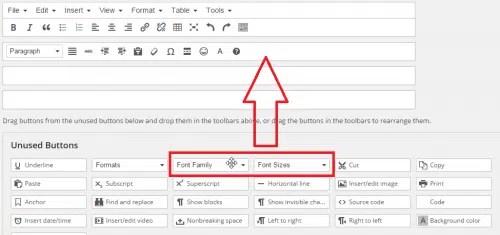Conquer Your WordPress Font Size: The Ultimate Guide
Ever stare at your WordPress website and feel like something's…off? Like the words are whispering instead of speaking? Often, the culprit is your font size. It’s a tiny detail with a massive impact. The right font size can transform your site from amateur hour to professional powerhouse, boosting readability and keeping visitors engaged.
Think about it. Have you ever landed on a website with text so minuscule you needed a magnifying glass? Or, conversely, text so large it felt like a children's book? Frustrating, right? Adjusting WordPress font size is crucial for creating a pleasant user experience, ensuring your content is accessible and inviting to all readers.
This guide dives deep into the world of WordPress font size manipulation, exploring various methods from beginner-friendly tweaks to advanced customization options. Whether you’re a complete newbie or a seasoned WordPress pro, you'll find valuable insights and actionable steps to take control of your website's typography.
Historically, modifying font size was a cumbersome process, involving fiddling with complex code. Thankfully, WordPress has evolved, providing a range of user-friendly tools that simplify the process. Now, even those with minimal technical skills can adjust font sizes with ease, opening up a world of design possibilities.
Mastering WordPress font size control is essential for creating a visually appealing and user-friendly website. It impacts everything from readability to brand consistency, shaping the overall perception of your online presence. A well-chosen font size contributes to a positive user experience, encourages engagement, and ultimately helps achieve your website's goals.
You can modify font sizes in WordPress using various methods. The simplest involves using the visual editor’s formatting options. Selecting your text and choosing a heading size (H1, H2, etc.) or using the font size dropdown menu provides quick adjustments. For more granular control, the WordPress Customizer allows modifying theme settings, including font sizes for different elements like headings, body text, and menus.
Alternatively, you can add custom CSS. This offers maximum flexibility, enabling precise adjustments to any element on your website. You can target specific classes or IDs and define font sizes using units like pixels (px), ems (em), or percentages (%).
Benefits of adjusting font sizes:
1. Enhanced Readability: Appropriate font sizes ensure your content is easily digestible, reducing eye strain and improving the overall reading experience. For example, using a larger font size for body text can make it more comfortable for users to read long articles.
2. Improved Accessibility: Adjusting font sizes caters to users with visual impairments, making your website accessible to a wider audience. Larger font sizes can be particularly beneficial for users with low vision.
3. Brand Consistency: Consistent font sizing across your website strengthens your brand identity and creates a professional, polished look. Using a specific font size for headings and another for body text contributes to a unified visual experience.
Step-by-step guide to changing font size using the WordPress Customizer:
1. Log in to your WordPress dashboard.
2. Go to Appearance > Customize.
3. Look for a section related to Typography or Theme Settings.
4. Find the options to adjust font sizes for different elements.
5. Make the desired changes and save them.
Advantages and Disadvantages of Changing Font Sizes
| Advantages | Disadvantages |
|---|---|
| Improved Readability | Potential Layout Issues if not implemented correctly |
| Enhanced Accessibility | Can affect website loading speed if using too many custom fonts |
| Stronger Brand Identity | May not render consistently across different browsers/devices |
FAQ:
1. Can I change font size for specific pages? Yes, using custom CSS.
2. How do I change the font size of my menu? Through the Customizer or custom CSS.
3. What’s the ideal font size for body text? Around 16px is generally recommended.
4. Can I use different fonts for different sections? Yes, using custom CSS or font plugins.
5. How do I preview font changes before publishing? Use the WordPress Customizer's live preview feature.
6. What if my font changes don't show up? Clear your browser cache or check for conflicting CSS rules.
7. Are there plugins for managing font sizes? Yes, several plugins offer advanced typography control.
8. How do I ensure my font size changes are responsive? Use relative units like ems or percentages.
Tips and Tricks:
Use a consistent font size hierarchy for headings and subheadings. Prioritize readability over aesthetics. Test your changes on different devices to ensure responsiveness.
Mastering font size control in WordPress is essential for creating a website that’s both visually appealing and user-friendly. It's a seemingly small detail with a significant impact on readability, accessibility, and brand consistency. By understanding the various methods available, from using the visual editor to implementing custom CSS, you can fine-tune your website's typography and create a truly engaging experience for your visitors. Take the time to experiment with different font sizes, consider your target audience, and strive for a balance between aesthetics and functionality. A well-optimized font size contributes to a positive user experience, encourages engagement, and ultimately helps your website achieve its goals. So, dive in, experiment, and watch your WordPress website transform into a well-designed and user-friendly online hub.
Finding faith and community in appleton wi
Conquer your fantasy league mastering cbs sports tiers
Unlock discords secret code how to add bolded text on discord pc














